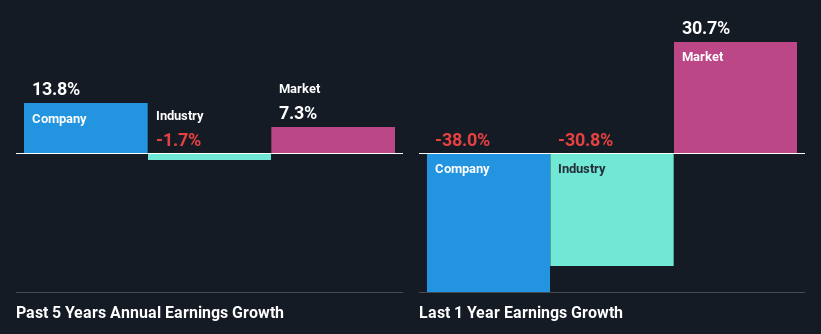Should Weakness in Balfour Beatty plc's (LON:BBY) Stock Be Seen As A Sign That Market Will Correct The Share Price Given Decent Financials?
With its stock down 15% over the past three months, it is easy to disregard Balfour Beatty (LON:BBY). However, stock prices are usually driven by a company’s financials over the long term, which in this case look pretty respectable. Particularly, we will be paying attention to Balfour Beatty's ROE today.
ROE or return on equity is a useful tool to assess how effectively a company can generate returns on the investment it received from its shareholders. In short, ROE shows the profit each dollar generates with respect to its shareholder investments.
View our latest analysis for Balfour Beatty
How Do You Calculate Return On Equity?
Return on equity can be calculated by using the formula:
Return on Equity = Net Profit (from continuing operations) ÷ Shareholders' Equity
So, based on the above formula, the ROE for Balfour Beatty is:
4.7% = UK£62m ÷ UK£1.3b (Based on the trailing twelve months to July 2021).
The 'return' is the income the business earned over the last year. That means that for every £1 worth of shareholders' equity, the company generated £0.05 in profit.
What Is The Relationship Between ROE And Earnings Growth?
We have already established that ROE serves as an efficient profit-generating gauge for a company's future earnings. Depending on how much of these profits the company reinvests or "retains", and how effectively it does so, we are then able to assess a company’s earnings growth potential. Assuming everything else remains unchanged, the higher the ROE and profit retention, the higher the growth rate of a company compared to companies that don't necessarily bear these characteristics.
Balfour Beatty's Earnings Growth And 4.7% ROE
On the face of it, Balfour Beatty's ROE is not much to talk about. However, given that the company's ROE is similar to the average industry ROE of 5.3%, we may spare it some thought. Even so, Balfour Beatty has shown a fairly decent growth in its net income which grew at a rate of 14%. Taking into consideration that the ROE is not particularly high, we reckon that there could also be other factors at play which could be influencing the company's growth. For example, it is possible that the company's management has made some good strategic decisions, or that the company has a low payout ratio.
Given that the industry shrunk its earnings at a rate of 1.7% in the same period, the net income growth of the company is quite impressive.
The basis for attaching value to a company is, to a great extent, tied to its earnings growth. It’s important for an investor to know whether the market has priced in the company's expected earnings growth (or decline). This then helps them determine if the stock is placed for a bright or bleak future. Is BBY fairly valued? This infographic on the company's intrinsic value has everything you need to know.
Is Balfour Beatty Efficiently Re-investing Its Profits?
Balfour Beatty's three-year median payout ratio to shareholders is 23% (implying that it retains 77% of its income), which is on the lower side, so it seems like the management is reinvesting profits heavily to grow its business.
Besides, Balfour Beatty has been paying dividends for at least ten years or more. This shows that the company is committed to sharing profits with its shareholders. Our latest analyst data shows that the future payout ratio of the company is expected to rise to 35% over the next three years. Still, forecasts suggest that Balfour Beatty's future ROE will rise to 12% even though the the company's payout ratio is expected to rise. We presume that there could some other characteristics of the business that could be driving the anticipated growth in the company's ROE.
Conclusion
Overall, we feel that Balfour Beatty certainly does have some positive factors to consider. Even in spite of the low rate of return, the company has posted impressive earnings growth as a result of reinvesting heavily into its business. With that said, the latest industry analyst forecasts reveal that the company's earnings are expected to accelerate. To know more about the company's future earnings growth forecasts take a look at this free report on analyst forecasts for the company to find out more.
This article by Simply Wall St is general in nature. We provide commentary based on historical data and analyst forecasts only using an unbiased methodology and our articles are not intended to be financial advice. It does not constitute a recommendation to buy or sell any stock, and does not take account of your objectives, or your financial situation. We aim to bring you long-term focused analysis driven by fundamental data. Note that our analysis may not factor in the latest price-sensitive company announcements or qualitative material. Simply Wall St has no position in any stocks mentioned.
Have feedback on this article? Concerned about the content? Get in touch with us directly. Alternatively, email editorial-team (at) simplywallst.com.

 Yahoo Movies
Yahoo Movies 

